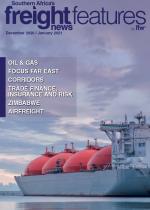A range of “hard” and “soft” infrastructure challenges are slowing down the movement of goods on the 18 transport corridors traversing the Southern African Development Community (SADC) region, according to the 2020 Annual State of Cross-Border Operations repor t (A SCBOR) compiled by the Cross-Border Road Transport Agency (C-BRTA).“Hard” challenges outlined in the report include: “Missing” road links in Botswana, Zambia and Zimbabwe that result in poor network connectivity and accessibility to regional economic hubs; Outdated and inappropriate information and communications technology (ICT) systems for facilitating the electronic sharing of information between regulatory authorities in corridors and at border posts; Poorly maintained road sections along regional road transport corridors; and Inefficient border posts.These are outnumbered by the “soft” challenges, which include: Disjointed regulatory frameworks characterised by inefficiency and variability in regulatory requirements between member states; Inefficient border posts owing to ineffective border management systems, paper-based systems in some countries, onsite execution of customs clearance procedures (instead of preclearance), lack of ICT systems for data exchange, and repetitive processes and procedures that cause lengthy delays for commercial road transport operators at border posts; Insufficient funds for infrastructure maintenance and construction; Limited private sector participation in the transport sector; Market access restrictions, which inhibit the free movement of cross-border traffic in the SADC region; Discrepancy in the level of road user charges (RUC) imposed on cross-border road transport operations; and Existence of various official and unofficial roadblocks and inspection points along regional road transport corridors that increase corrupt practices.Transporters and freight owners are however finding routes around the roadblocks, the report points out. “A new development in the region is witnessed in ongoing infrastructure improvements at the ports of Walvis Bay and Beira that are diverting traffic from strategic (and congested) road transport corridors in the region (e.g. North South Corridor) to less-trafficked, but strategically located routes, such as the TKC (Trans Kalahari Corridor) and the Walvis Bay-Ndola Lubumbashi development corridors. “Both corridors link the port of Walvis Bay through an integrated system of well-maintained tarred roads and rail networks with various landlocked countries in the SADC (Botswana, Democratic Republic of the Congo, Zambia, Zimbabwe and Malawi), thereby connecting countries in the interior to African and foreign markets via the port of Walvis Bay,” states the annual report.There are also some positive developments on other corridors. “Various infrastructure projects/programmes have been approved and are currently been implemented in the SADC to address some of the bottlenecks and constraints,” according to the report.Governments, however, need to press harder on the accelerator to speed up the implementation of the many plans and agreements that have been signed over the years to stimulate regional economic growth and job creation through more efficient trade corridors.
Roadblocks stymie regional economic development
04 Feb 2021 - by Liesl Venter and Ed Richardson
0 Comments
Compendium December 2020-January 2021

04 Feb 2021
04 Feb 2021
04 Feb 2021
04 Feb 2021
04 Feb 2021
04 Feb 2021
04 Feb 2021
04 Feb 2021
04 Feb 2021
Border Beat
25 Jun 2025
17 Jun 2025
Poll
Featured Jobs
New
New
